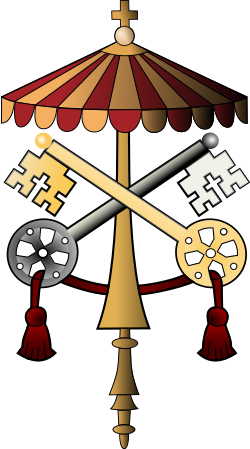 |
| The Arms of the Empty See of Rome |
I don't give any great weight to what follows, I have no special insight, but I'd like to say something, however ill-informed, to counter the concern, or even panic, of some attached to Pope Benedict's work. Will it all be undone by the next Pope?
No, it won't. There are lots of reasons. Here are three.
First off, one Pope does not undo the work of his predecessor. There have been cases of policy reversals: the change of attitude to the French state, for example, between Pius X and his successors. But this can (at least in principle) be attributed to changing circumstances. The following popes might even say that the former policy had served its purpose. In the most extreme cases, for example between the liturgical conservatism of Bl. John XXIII and the reforms of Paul VI, efforts were still made to draw a line from the old papacy to the new - obviously, is was John who summoned the Council which called for a reform, and John's demand for Latin was the basis of official documents under Paul. What we never get - not since the more chaotic moments of the early Middle Ages - is a pope denouncing his predecessor. There is no de-Stalinisation.
That, of course, explains the achingly slow process of dealing with the aftermath of the Council. It does happen that a pope admits a predecessor made a mistake, but he doesn't do it explicitly. A good example is the repudiation of Pius XII's new Latin Psalter at the Second Vatican Council: the work 'happily begun' should be 'completed': ie chucked out. Pope Benedict's did something similar in reversing the policy of Bl. John-Paul II on the Traditional Mass.
This may seem pious or diplomatic nonsense, but there is wisdom in the thought that leaders undermine themselves when they attack their predecessors. We needn't wonder why people have so little respect for politicians. The office of the Papacy deserves respect.
Second, many of the most important things Pope Benedict did are irreversible. Popes have supreme legislative power, but there are things which they just won't do. No Pope is going to rescind Anglicanorum Coetibus; he might I suppose fiddle with the details of the Ordinariate, but he won't do more than that. Once something like that, like a religious order, has been set up, it is only suppressed in the direst circumstances. That goes also for the privileges it might have, necessary for its special vocation.
 |
| The Cross stands while the World turns. |
With the Traditional Mass, Pope Benedict's reform is bomb-proof, because it created a legal fact: the 1962 Missal had never been abrogated. A future pope may or may not be vigorous in pushing it, but no priest can be disciplined for saying it. We mustn't forget that that was the sort of thing that happened in the dark days of the 1990s. Pope Benedict has burnt the stick used to beat trads. It's not coming back.
Third, the Conclave will not elect a liberal. If we must talk in these terms, there are in fact no traditionalists in the College of Cardinals under 85. There are plenty of liberals, a good number appointed by Pope Benedict. But they won't appoint anyone wooly-minded who wants to 'reach out' to the divorced and homosexual couples, or install dancing-girls in St Peter's. The reason is that the Church is facing persecution all over the world, and the Cardinals will want someone who is tough.
Liberal cardinals perhaps most of all are feeling very sore about this persecution; they have borne some of it personally. What sort of mood will Cardinal Daneels or Mahoney be in at the conclave? The cosy relationship they thought they had with the World - leaving aside the Flesh and the Devil - has turned very sour. They will vote for someone who will defend the Church with vigour.
The liberal media would like to influence the Church, but they have forgotten Aesop's fable of the wind and the sun: which could detach the man from his warm cloak? It was the sunny climate of optimism which brought out the liberal policies of the 1970s; the icy winds of today will not have that effect.
That's interesting, and I agree with you that the next pope will do nothing to either Summorum Pontificum or Anglicanorum Coetibus (well, he might, but it's not likely), but then he might well be around for a very long time, as long as John Paul II or longer, in which case years from now he might do whatever he likes. Who is to say that in 2025 Summorum Pontificum will be relevant? Perhaps the Ordinariates will have died a death by then? Perhaps practice of Roman Catholicism will be illegal in many parts of the world? There is very little point in predicting or worrying about the next incumbent of the old Roman see.
ReplyDeletenteresting words from His Holiness - given at the Major Roman Seminary on Sunday evening last:
ReplyDelete“The church always renews itself; it is continually reborn. The future is ours. Of course, there is a false optimism and a false pessimism. A false pessimism says that the time of Christianity has come to an end. No: it begins again! A false optimism was that witnessed immediately after the Council when convents and seminaries were closed and people said: it doesn’t matter, everything is good. No: this is not good! There are also serious and grave dangers. We have to recognize with a healthy realism that all is not well. It is not good when they do wrong things. At the same time, we have to be sure that even though here and there the Church dies for the sins of humans, because of their lack of belief, at the same time, it is reborn."
http://visnews-en.blogspot.co.uk/2013/02/pope-visits-major-roman-seminary.html